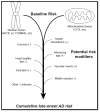Is Alzheimer's disease a systemic disease?
- PMID: 24747741
- PMCID: PMC4126236
- DOI: 10.1016/j.bbadis.2014.04.012
Is Alzheimer's disease a systemic disease?
Abstract
Although Alzheimer's disease (AD) is the most common neurodegenerative disease, the etiology of AD is not well understood. In some cases, genetic factors explain AD risk, but a high percentage of late-onset AD is unexplained. The fact that AD is associated with a number of physical and systemic manifestations suggests that AD is a multifactorial disease that affects both the CNS and periphery. Interestingly, a common feature of many systemic processes linked to AD is involvement in energy metabolism. The goals of this review are to 1) explore the evidence that peripheral processes contribute to AD risk, 2) explore ways that AD modulates whole-body changes, and 3) discuss the role of genetics, mitochondria, and vascular mechanisms as underlying factors that could mediate both central and peripheral manifestations of AD. Despite efforts to strictly define AD as a homogeneous CNS disease, there may be no single etiologic pathway leading to the syndrome of AD dementia. Rather, the neurodegenerative process may involve some degree of baseline genetic risk that is modified by external risk factors. Continued research into the diverse but related processes linked to AD risk is necessary for successful development of disease-modifying therapies.
Keywords: Alzheimer's disease; Exercise; Metabolism; Mitochondria; Physical activity.
Copyright © 2014 Elsevier B.V. All rights reserved.
Figures

References
-
- Thies W, Bleiler L, Alzheimer’s A. 2013 Alzheimer’s disease facts and figures. Alzheimers Dement. 2013;9(2):208–45. - PubMed
-
- Agosta F, Pievani M, Sala S, et al. White matter damage in Alzheimer disease and its relationship to gray matter atrophy. Radiology. 2011;258(3):853–63. - PubMed
-
- Backman L, Jones S, Berger AK, et al. Multiple cognitive deficits during the transition to Alzheimer’s disease. J Intern Med. 2004;256(3):195–204. - PubMed
-
- Riviere S, Gillette-Guyonnet S, Andrieu S, et al. Cognitive function and caregiver burden: predictive factors for eating behaviour disorders in Alzheimer’s disease. Int J Geriatr Psychiatry. 2002;17(10):950–5. - PubMed
-
- Johnson DK, Wilkins CH, Morris JC. Accelerated Weight Loss May Precede Diagnosis in Alzheimer Disease. Arch Neurol. 2006;63(9):1312–1317. - PubMed
Publication types
MeSH terms
Grants and funding
- R01 AG043962/AG/NIA NIH HHS/United States
- F32AG044953/AG/NIA NIH HHS/United States
- P30 AG035982/AG/NIA NIH HHS/United States
- R01AG033673/AG/NIA NIH HHS/United States
- R01AG034614/AG/NIA NIH HHS/United States
- KL2 TR000119/TR/NCATS NIH HHS/United States
- F32 AG044953/AG/NIA NIH HHS/United States
- R01 AG033673/AG/NIA NIH HHS/United States
- K01 AG035042/AG/NIA NIH HHS/United States
- K01AG035042/AG/NIA NIH HHS/United States
- UL1 TR000001/TR/NCATS NIH HHS/United States
- R01AG043962/AG/NIA NIH HHS/United States
- P30AG035982/AG/NIA NIH HHS/United States
LinkOut - more resources
Full Text Sources
Other Literature Sources
Medical

